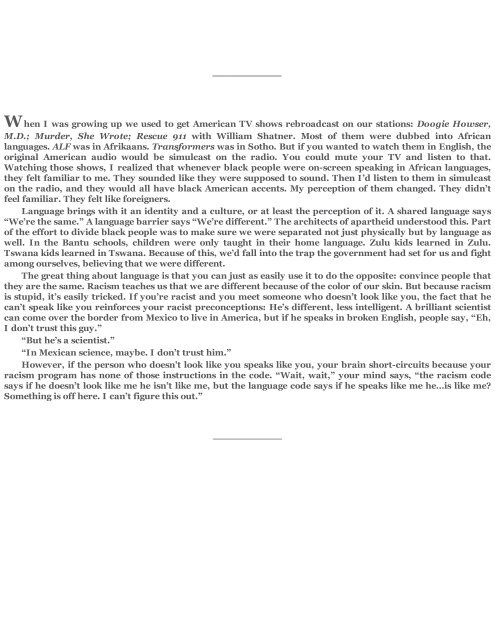Create successful ePaper yourself
Turn your PDF publications into a flip-book with our unique Google optimized e-Paper software.
W hen I was growing up we used to get American TV shows rebroadcast on our stations: Doogie Howser,<br />
M.D.; Murder, She Wrote; Rescue 911 with William Shatner. Most of them were dubbed into African<br />
languages. ALF was in Afrikaans. Transformers was in Sotho. But if you wanted to watch them in English, the<br />
original American audio would be simulcast on the radio. You could mute your TV and listen to that.<br />
Watching those shows, I realized that whenever black people were on-screen speaking in African languages,<br />
they felt familiar to me. They sounded like they were supposed to sound. Then I’d listen to them in simulcast<br />
on the radio, and they would all have black American accents. My perception of them changed. They didn’t<br />
feel familiar. They felt like foreigners.<br />
Language brings with it an identity and a culture, or at least the perception of it. A shared language says<br />
“We’re the same.” A language barrier says “We’re different.” The architects of apartheid understood this. Part<br />
of the effort to divide black people was to make sure we were separated not just physically but by language as<br />
well. In the Bantu schools, children were only taught in their home language. Zulu kids learned in Zulu.<br />
Tswana kids learned in Tswana. Because of this, we’d fall into the trap the government had set for us and fight<br />
among ourselves, believing that we were different.<br />
The great thing about language is that you can just as easily use it to do the opposite: convince people that<br />
they are the same. Racism teaches us that we are different because of the color of our skin. But because racism<br />
is stupid, it’s easily tricked. If you’re racist and you meet someone who doesn’t look like you, the fact that he<br />
can’t speak like you reinforces your racist preconceptions: He’s different, less intelligent. A brilliant scientist<br />
can come over the border from Mexico to live in America, but if he speaks in broken English, people say, “Eh,<br />
I don’t trust this guy.”<br />
“But he’s a scientist.”<br />
“In Mexican science, maybe. I don’t trust him.”<br />
However, if the person who doesn’t look like you speaks like you, your brain short-circuits because your<br />
racism program has none of those instructions in the code. “Wait, wait,” your mind says, “the racism code<br />
says if he doesn’t look like me he isn’t like me, but the language code says if he speaks like me he…is like me?<br />
Something is off here. I can’t figure this out.”
















